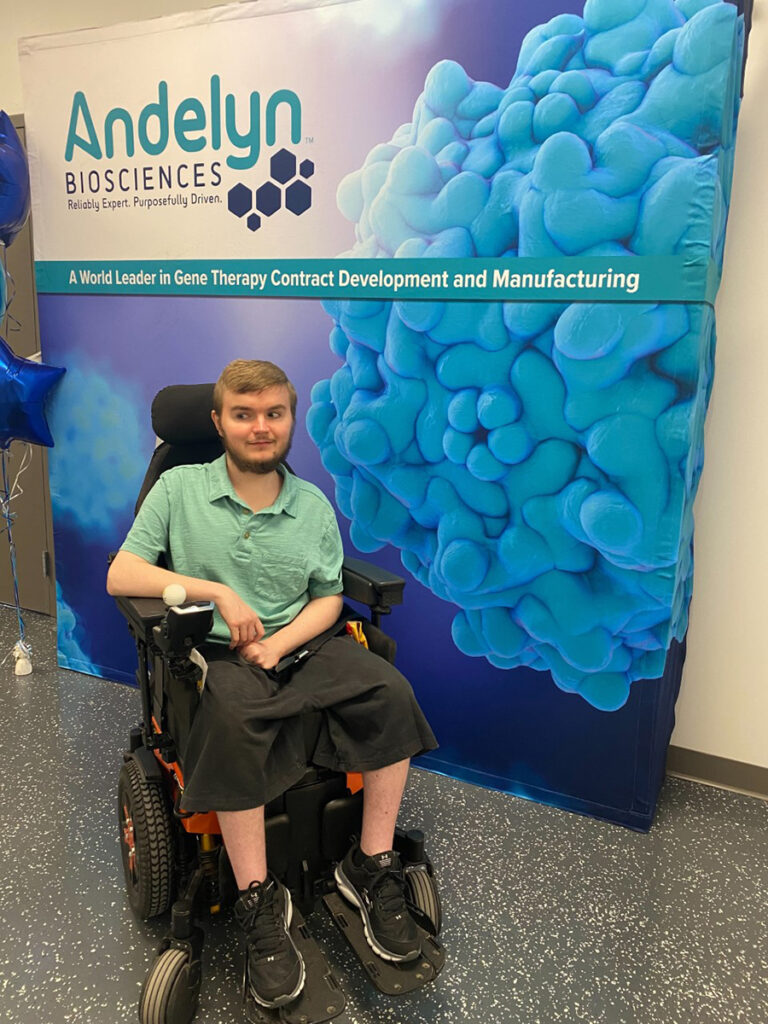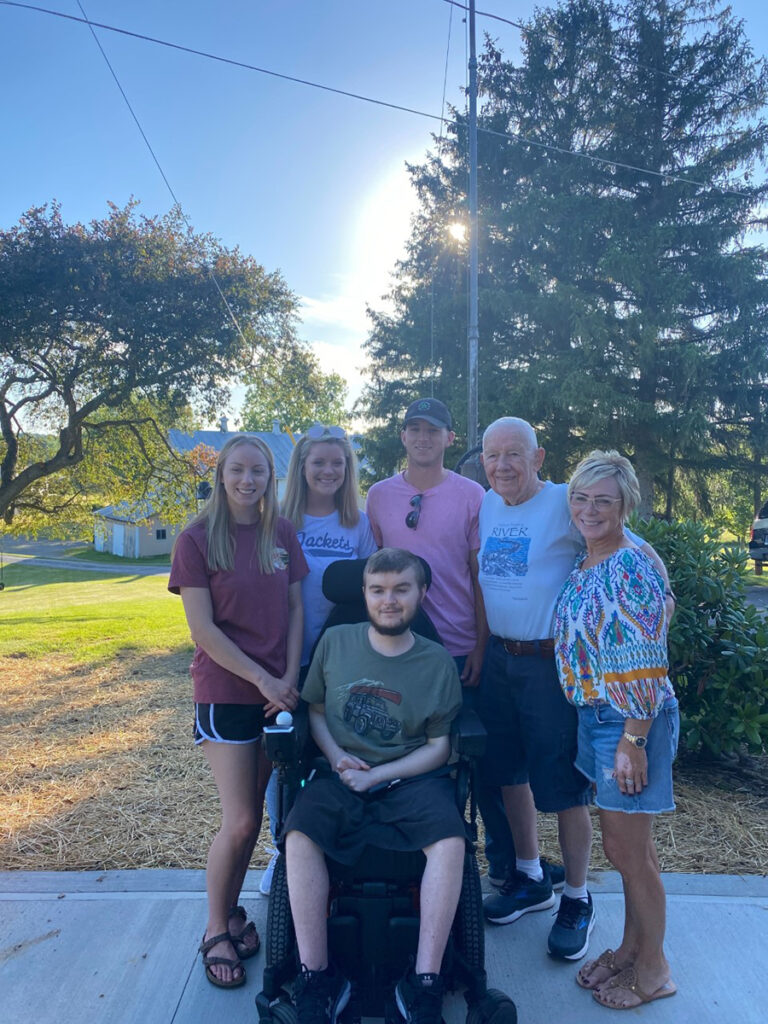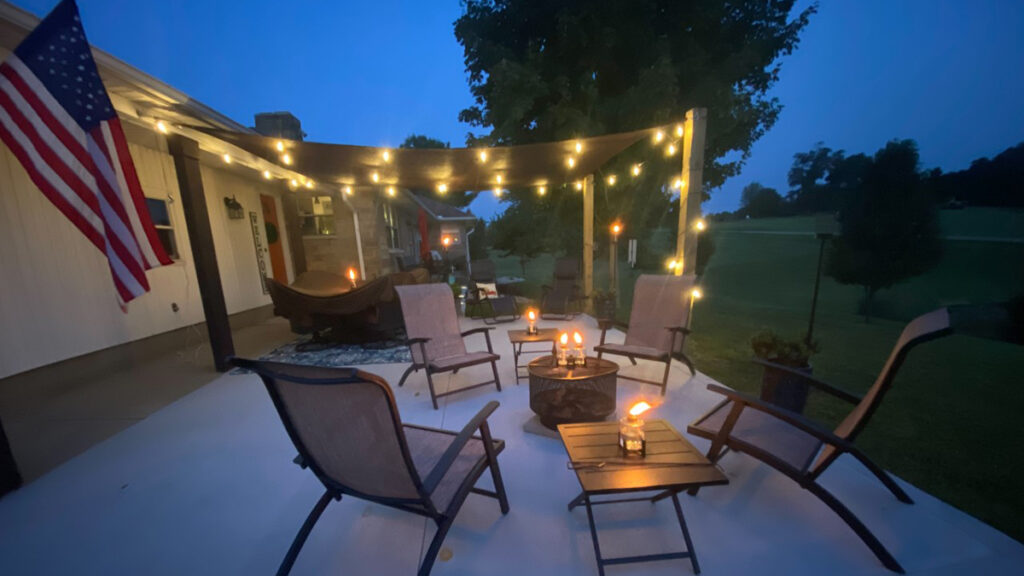Whole Lotta Love: The Selfless Life of a Caregiver
As a young teen, Julie Wilson Kilbarger found her calling to care for others, which helped with caring for her son with muscular dystrophy.
Oct 27, 2022
When her friends were riding bikes and skipping rope, sixth-grader Julie took time to hang out with Clara, a lonely old woman who'd sit on her porch across the street from Julie's house, watching life go by. And that's when a life of caring began.
"She gave me the foundation and prepared me for what my life would become in the future," says Julie Wilson Kilbarger of Lancaster, Ohio, about 30 miles southeast of Columbus.
“She was in her 80s, and I believe she had been a banker in our town and was very well known. I just started going over to talk to her on her front porch and slowly became more and more of a caregiver to her," she says. "I would make sure she had groceries and clean for her. She talked to me about boys, school, our Catholic faith, and genuine love. Clara gave me love and the true meaning of kindness, and I learned to be selfless."
Their friendship grew, and Julie was a carer for her friend until junior high when Clara passed away. “I actually named my daughter Claire after Clara, because she had no children and I just loved her so much," Julie says. "Her heart was so beautiful and faithful. I'm sure I needed her more than she needed me."
Julie went on to Ohio University to study communications, and she was an overnight caregiver for another elderly woman for a few years at the same time — “I always loved geriatrics." Next, she became a social worker and worked with people who had mental challenges and needed assistance.
More than a parent
After she married and started a family, though, her vocation as a caregiver was pushed into overdrive. She has three children who were all born close together — Kyle, who is now 27, Andrew, 25, and Claire, 23. When Andrew was 4 years old, he was diagnosed with Duchenne muscular dystrophy (DMD), a rare and fatal neuromuscular disorder that's one of the most aggressive forms of muscular dystrophy.

While a discovery like this would undoubtedly be a devastating shock to any parent, as she looks back, Julie says, “It's been a wonderful journey, taking care of him and watching him grow into this amazing young man."
Andrew is now 25, and the average life expectancy for someone with DMD is in the mid to late teens. “We were able to connect with one of the top five researchers in the country, Dr. Jerry Mendell at Nationwide Children's Hospital here in Columbus, and we have been on the journey with him," Julie says.
“Andrew became one of the first in the world to go through a dystrophin gene transfer." That was when Andrew was just 8 years old in March 2006. It was a milestone for Dr. Mendell too: He was the first to inject microdystrophin, a shorter version of the protein that people with DMD are lacking, into a patient when he completed the procedure on Andrew that day.
Andrew and the Kilbargers' willingness to try innovative experimental treatments has helped Dr. Mendell advance his pioneering gene therapy work, and in 2019 the FDA approved his cure for spinal muscular atrophy (SMA). It was the first FDA-approved systemic gene therapy.
Now Andrew is an ambassador for a new cell and gene therapy organization that Children's Hospital created. “They named it after Andrew and this little girl that it cured [of SMA], Evelyn Villarrea," Julie says. “It's called Andelyn Biosciences." Although a cure for DMD has not yet been discovered, Andrew takes satisfaction from the fact that his involvement in research has helped other children, like Evelyn.
Love across the generations
Of course, all the excitement about Andrew's crucial role in this cutting-edge medical research doesn't mean it's been an easy road. “It's just been a process, a lot of doctors appointments," Julie says. “He stopped walking at the age of 12, so he's not mobile, and I make sure that he has all his needs met."
Julie's parents moved close to her when Andrew was diagnosed so they could help out the family. Years later, though, illness made living on their own impossible, so they moved in with Julie.
“I watched my dad and his siblings keep his mom at home as long as he could, and I watched my mom take care of her mother at our home as long as possible," Julie explains. “And I just knew that I wanted to do that for my parents and be the one to take care of them and comfort them and love them and coddle them and care for them, because I've watched it and that's what I love doing."
Julie, 53, left her job in 2017 and stayed home for a year and a half — before returning to work — caring for her parents and Andrew. Her mom, Hannah, 81, finally had to go into a nursing facility when her aggressive dementia made home care impossible. “I do my mom's laundry and I decorate her room to make sure it looks pretty for her. And sometimes I do her hair or go over and feed her," Julie says. Her dad, Bob, is 87 and has his own medical challenges and still lives with Julie and Andrew. The couple recently celebrated 63 years of marriage.
“I don't think I do anything special," Julie insists. “To me, this is my life, it's normal. I love my parents and I love my children and I do what is needed." She admits that she's puzzled when friends and family disagree and say she goes above and beyond and inspires them.
Sudden tragedy
Julie suffered a heartbreaking loss in January 2022 when her fiancé, Scott, collapsed and died at their home. He was just 50. Julie's father found him when he returned from visiting her mom. “We'd been together for almost nine years," she says. "He was a good soul — when we met in July 2013, he didn't run after finding out about my caregiver responsibilities."
In fact, Scott embraced them, helping out where he could. "He actually would pitch right in with Andrew with restroom needs and making dinner for Andrew and my father, and he helped with cleaning and laundry too," Julie says.
She's still reeling from losing Scott and his emotional support and love. "He was my shoulder to cry on when the doctor appointments were not the best with Andrew," she says. "He held my hand all the time and gave me words of encouragement. We did everything together, and we loved deeply together."
Creating time for self-care

With such a lot on her plate, both practically and emotionally, Julie knows she needs to make time for herself. “Self-care is obviously super, super important," she agrees. “But you have to find what works for you."
For Julie, giving herself some quiet time in the morning is essential. “I need to start my day with a grateful heart that I'm waking up," she says. “The first thing I do every morning is pray and read my reading for five minutes, and it sets my tone for the whole day. Maybe that's why I'm so happy."
She admits that for her, doing the dishes and mopping the floor are therapeutic too, “because I'm a clean freak, and that makes me happy." But she also makes time for a dinner out with her friends, or grabs 10 minutes in the evening and sits on her patio with a glass of wine, watching the sun set over the fields at her house. “Finding time for yourself, finding that five or 10 minutes of happiness per day, you have to make sure it happens."
Julie is delighted that Kyle and Claire live close by too and says she's proud of all their achievements. Kyle is a junior superintendent at the Lancaster Golf Club in Ohio, and Claire is a talented artist who works on website design for a Midwest clothing retailer.
Preparing for the future
Going forward will be challenging, as Andrew now is in cardiac heart failure. “So we are dealing with that," Julie says, talking about scans and meeting with the heart specialists. The palliative care team has also encouraged Andrew to start writing down instructions for and making decisions about end-of-life care.
Julie says their Catholic faith has given them strength. “Andrew has grounded himself, and he's gone through the grieving process," she says. “He says, 'I know I'm going to die, but I know where I'm going, and I'm okay with that.'"
She is full of admiration for Andrew's approach to life and his disease: "He asks questions, he researches, he looks, and he understands," she says. "He's very, very intelligent — DMD doesn't affect your mind. Sometimes he's stronger than me."

And that's saying something — Julie is clearly resilient and so strong herself. Her positive attitude is remarkable. "It could be so much worse," she says. "I'm just so fortunate and so lucky: Andrew is still here; I still have my parents; I'm able to walk and talk and take care of stuff; I have a car, the house; I can feed my family. I'm just so grateful."







